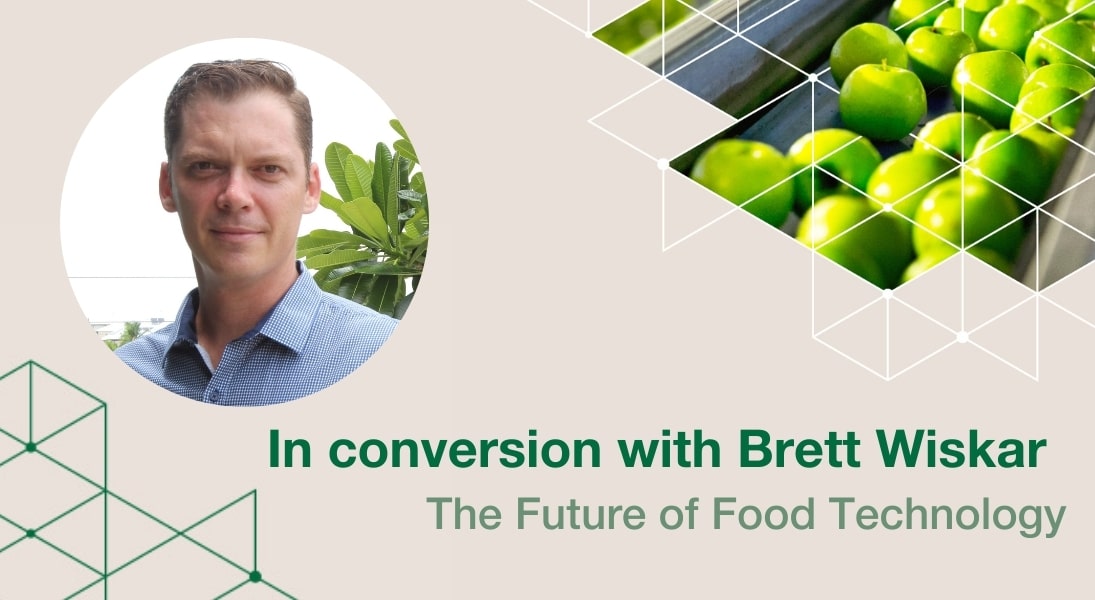In conversation with Brett Wiskar | The Future of Food Technology
Brett Wiskar is the Chief Future Officer at Wiley. He has worked with some of the largest brands in the country on their digital roadmap and innovation programs. He will be speaking at foodpro 2021 in the Schneider Electric Dome Theatre on the The Future of Food Technology. foodpro sat down with Brett to discuss what is on the forefront of food technology.
Tell us about your role at Wiley?
Brett: “I’ve been with Wiley for more than five and a half years, which was my first point of entry into the food industry. Wiley, however, has a long history in the food industry, with facility design and engineering of processes and systems, and delivering commercial outcomes for the food sector to a lot of sizable food entities. We are involved in many projects in the red meat and protein sectors, but also across cold storage, logistics, food processing and value adding right across Australia and overseas.
I have a range of responsibilities at Wiley as Chief Future Officer. My responsibility to the market and our clients is looking at the future of industry, the future of technology and how trends are going to disrupt the existing status quo in industry so that facilities and organisations and industries can prepare themselves to take advantage of what’s coming in the future.”
How do you think COVID-19 impacted the food technology industry?
Brett: “There will be businesses and supply chains that will see the opportunity to capitalise on localised production and secure local food sources. I suspect that will just be a portion of the industry.
A lot of players in a lot of industries are essentially battening down the hatches waiting for everybody to be vaccinated so that they can return to ‘life as normal’. Whether that ‘life as normal’ comes back or not, remains to be seen. Some of the adaption and pivoting may come down to whether those businesses have the capital to innovate, or the cultural mindset, or the skillset or the appetite to go about disrupting their own business model.”
What are some of the trends you are seeing in the industry right now?
Brett: “I think sustainability has to be a core part of all food company’s strategies, not just in terms of things like the announcements in the last few weeks from Coca Cola and Woolworths about their aspirations to minimise their own packaging to include more recycled content, but also to recycle a lot of their own waste products. That’s a topic that really was seen as academic or conservation-driven just a few years ago, and now it’s a cool conversation that’s being held in a lot of organisations driven by societal changes, and that’s coming with technology solutions on the back of it.
We’ve been hearing across a lot of industries for at least a decade that data is the new oil…I think the food industry doesn’t really know what to do with their data strategy at this point in time. What we are finding is a lot of businesses could benefit from data, but the data doesn’t exist in their business or exists in very disparate formats. These systems in their business don’t talk to each other.
Often businesses are unable to have a dashboard that tells us what’s working in certain aspects of a business. Access to data is critical with increasing system automation, and the rise of accessible, machine learning or artificial intelligence if you use that term. For businesses to gain access to the benefits of those solutions, they’re going to need data in a particular way. They’re going to need a data strategy, they’re going to need to capture it all and integrate it and if you have portions of your process or portions of your supply chain that aren’t sharing data, that’s something that needs to be addressed.”
Who is your session aimed at?
Brett: “This year foodpro’s theme is, ‘The Future of Food’, so on some level it’s for everybody. I think the reason people come to foodpro is to keep abreast of current trends, insights, and innovations.
I’m going to talk about what the major items are that will unfold in the next five years, 10 years and 15 years, that should be considered if you’re going to move forward in the industry in terms of production and facilities.”
It’s been four years since the last foodpro expo. What are you looking forward to?
Brett: “foodpro brings people together that’s the real value, combined with the sharing and gathering of knowledge. It brings operations managers, general managers, engineers, new product development people, procurement people and providers of equipment and services. In terms of its economic value to industries, it is quite sizable in that a lot of the conversations across industry probably take place at foodpro.
If you’re looking to do a project, or expand, or update, or innovate, or change something, then what better place than foodpro, where you have exposure to all of those skills, services and equipment.”
What interests you personally about this year’s foodpro?
Brett: “Whenever I come to foodpro, my favourite activity is looking at some of the more interesting aspects of automation. The other really interesting aspect is what people and core suppliers to industry are doing in a sustainability space.
We are seeing major trends of automation and integration and data and sustainability. The interesting thing for me is to go and look at the leaders in the market and see if these companies are on trend. Are they keeping pace? Are they the ones that are driving the change that we believe we’re going to see in the years ahead?”
Brett will be speaking as part of foodpro 2021 at the Sydney Showground in the Schneider Electric Dome Theatre, from July 25-28. Registrations for the event are essential before attending, click to register for free now.
-
Stay up to date with the latest news, industry insights and foodpro updates.
- Subscribe

